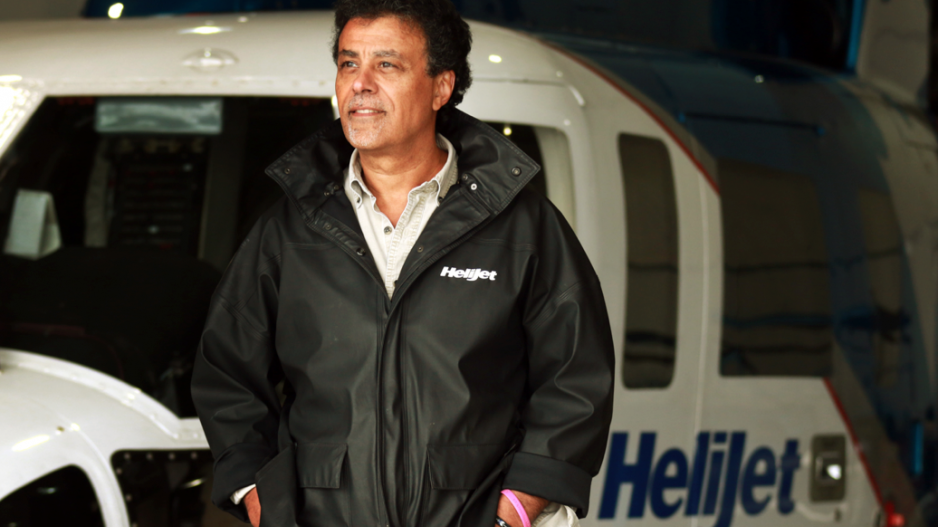Some people might say that their future came dropping out of the sky, but for Danny Sitnam, president and CEO of Helijet International Inc. (CVE:HJI), that’s what literally happened.
“I worked as a chef for the Keg when I was in high school to make my keep, and after a while I progressed to opening kitchens for [franchise owner] George Tidball,” Sitnam told Business in Vancouver.
“We were working on opening a restaurant on Burnaby Mountain which was an offshoot of the Keg branch, and one day a helicopter came swooping in and landed in the grass field in the back of the restaurant when I was on break.
“The pilot shut down and walked over. I remember it was a Saturday and I was preparing food for the day. He started making small talk and he told me he was waiting for a client. The client never showed up. He looked at his watch and said, ‘Well, he paid for the flight. I’m going to go; Do you want to go for a ride?’
“So off we went, and after that fateful day, I investigated getting my helicopter licence, cobbled the money together and a year later I was licensed and off I went to the Yukon.”
After obtaining his commercial licence in May 1977, Sitnam spent eight years in remote regions of the Yukon, Alberta and B.C. working as a pilot, flying light-to-medium-sized utility helicopters. It was a lifestyle he greatly enjoyed – and one that his son, who is in his 20s, now enjoys as well. Thirty years later, Sitnam is one of the industry’s most acclaimed company leaders for his direction as president and CEO of Helijet and its subsidiary, Pacific Heliport Services.
The excitement of flying was what drew Sitnam to the industry, but nowadays he has become accustomed to saying he flies a desk rather than a helicopter.
“I don’t really have time for flying,” he said. “I still keep my licence and could get back in the saddle if I wish, but when you are flying, your head should be just in the cockpit, nowhere else.”
Recently, the Lockheed Martin (NYSE:LMT) company Sikorsky held an event recognizing Sitnam and Helijet for contributing to a seven-million-flight-hour milestone. The company also recognized Sitnam for his “dedication and commitment to safety, leadership and training for 30 years.”
Helijet has 11 Sikorsky-made S-76 helicopters in its fleet, used primarily for scheduled passenger transport, air medical services and corporate charter services.
Last year, its revenue in on-demand and contracted services was over $35 million, and its workforce comprises about 160 full-time positions. The company’s headquarters are on the south side of the Vancouver Inernational Airport terminal in Richmond, and it has offices downtown.
Rules and regulations
Sitnam said it’s ironic that flying is often thought of as the ultimate freedom, yet careful restrictions on the use of airways are a constant challenge in the aviation industry.
“It is a highly regulated business; there is a lot of oversight on aviation companies,” he said. “The barriers are quite high these days for people wanting to operate their own business in the aviation industry. Being a pilot or engineer – those are obviously still very worthwhile … but running the business is very challenging because of the regulatory environment and because of the controlled airspace we operate in.”
When asked why he believes Helijet has experienced such success, Sitnam attributed his good fortune to the company’s business model.
“We have never been reliant on the resource industry or the oil and gas industry. Helicopters are used extensively in those markets, specifically offshore, some onshore, but Helijet has never been in that market.
“Our area is niche. We cater [to] the scheduled airspace market, we are in the air medical market and we are in very specific tourism markets up in the central coast of British Columbia.”
Ask Sitnam about the future, and he’ll tell you the future is now.
“Our future is continually looking for the economies of scale, best practices, trying to do things smarter, better processes and better processing systems that can make it a more efficiently operating company and a safer company.”
“We are happy in the size we are today,” he added – though zero growth is never an option for such a large business. And when Sitnam considers future partnerships, one path looks clear.
“Drones will take over helicopter work – even my clients are telling me that,” Sitnam said. “Movie and filmmaking, patrolling pipelines – these things can be done by drones nowadays, and drone technology is advancing very quickly, so we could certainly be interested in partnering up that way.”
On June 15, Sitnam will be inducted into Canada’s Aviation Hall of Fame (CAHF) during that organization’s 44th annual gala dinner at the Vancouver International Airport.
Rod Sheridan, CAHF board chairman, said Sitnam “has amassed an outstanding record as an entrepreneur in rotary flight operations in British Columbia and as one of the industry’s most progressive and admired company leaders.”
The Helijet CEO, he added, “is legendary for his proactive mentoring and development of staff, especially female flight crew, and his insistence on core company values of safety, customer dedication, mutual respect and trust and professionalism.”
In his personal life, Sitnam hopes to travel as much as possible in the coming years. A recent trip overseas stirred in him a budding desire to contribute elsewhere.
“I just recently came back from Africa with my family; my brother lives over there and heads up World Vision International,” Sitnam said. “I have a humanitarian interest and I wanted to see how we can help either individually or as a company.”
In his spare time, Sitnam cultivates his green thumb and passion for landscaping in his backyard. He lives on the North Shore with his wife, Laura.




